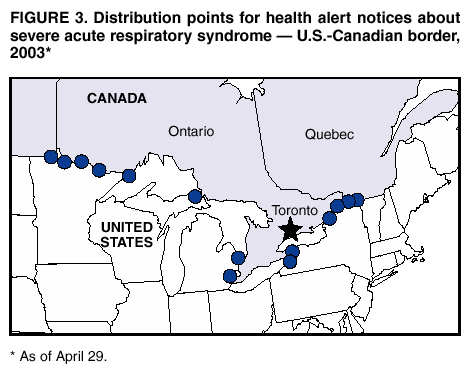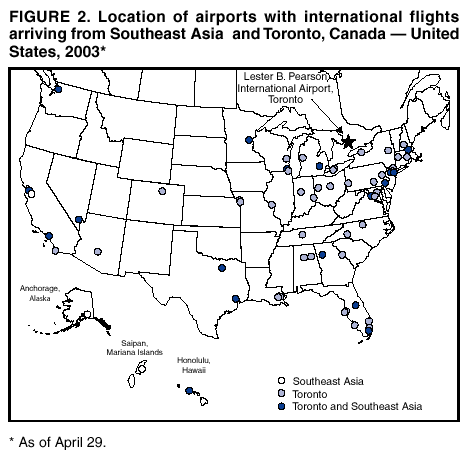Skip to comments.
U.S. Approves Force in Detaining Possible SARS
Carriers
New York Times ^
| May 6, 2003
| PHILIP SHENON
Posted on 05/06/2003 7:54:33 PM PDT by Dog Gone
 ASHINGTON, May 6 — As part of the government's efforts to prevent an epidemic of SARS in the United States, the Bush administration has authorized immigration and customs agents at the nation's international airports to use force to detain arriving passengers who appear to have symptoms of the disease, senior administration officials said.
ASHINGTON, May 6 — As part of the government's efforts to prevent an epidemic of SARS in the United States, the Bush administration has authorized immigration and customs agents at the nation's international airports to use force to detain arriving passengers who appear to have symptoms of the disease, senior administration officials said.
The Department of Homeland Security, which is responsible for immigration and customs inspections at airports and other border crossings, has provided masks and gloves to thousands of its airport inspectors in the last month as part of the agency's effort to stem transmission of SARS, or severe acute respiratory syndrome, which can be deadly.
At training sessions, officials said, the inspectors have been told that their screening duties now go beyond passports and baggage and that they need to give extra attention to the health of passengers arriving on 51 daily flights from Asian cities where the SARS outbreak has been most severe, including Beijing, Hong Kong and Singapore.
Officials said that the tightened screening procedures had gone into effect gradually in the last few weeks and that, so far, no airline passengers had required forcible detention, suggesting that the efforts of Asian governments and major airlines to prevent passengers infected with SARS from boarding trans-Pacific flights had been successful.
Under the new procedures, officials said, immigration and customs agents identifying arriving passengers who appear to be ill with any SARS symptoms, including high fever or breathing trouble, will be authorized to detain them and summon health inspectors.
If SARS is confirmed, they said, the passenger would be moved to a hospital or other medical facility and placed under mandatory quarantine. An executive order signed last month by President Bush lets the government quarantine people infected with SARS.
The immigration and customs agents have been told that they can decide for themselves whether to wear the disposable masks and gloves.
"Obviously, our people are on the front line," said Robert C. Bonner, the commissioner of customs and border protection. "And we have a duty to do. When we know you're coming off a flight from an area where SARS is a concern, we're going to be looking for signs and symptoms."
Mr. Bonner oversees the work of inspectors who, before the creation of the Department of Homeland Security earlier this year, had worked for the Customs Service, the Immgration and Naturalization Service, and the Border Patrol.
Another senior administration official said that while there had been no need so far to detain ailing passengers arriving at American airports from overseas, the government feared that the day would come soon when large numbers might need to be stopped.
"We want our people to be ready to invoke this authority," said the official, who is helping organize the administration's response to the disease. "We need the message out there that travelers who arrive on our shores cannot bring this disease with them. This is a national security issue."
The airport immigration and customs inspectors will provide backup to the teams of federal public health inspectors who were dispatched to airports around the United States after the initial reports of the SARS outbreak in Asia in March.
The Public Health Service inspectors have been meeting flights arriving from SARS-affected countries in Asia — both to hand out small information cards about SARS and to give passengers an initial, if cursory, screening for signs of illness.
Mr. Bonner said that his inspectors would be careful to differentiate between passengers who might have SARS and those who might be suffering from other illness with similar symptoms There is no test yet available to identify SARS conclusively.
"We are paying attention to SARS," he said. "On the other hand, you don't want to start quarantining or detaining everybody who gets off a plane and has a cough."
Though inspectors at seaports and land border stations have been placed on alert for SARS, there are no plans for similar screening procedures for passengers arriving by sea or land. Few travelers arrive in this nation directly from SARS-affected countries by any travel route other than air.
Administration officials said the most intense screening for possible cases of SARS was taking place at the handful of large international airports that handle the bulk of flights arriving in the United States from SARS-affected nations in Asia: Los Angeles International, San Francisco International, Newark Liberty International, Kennedy International in New York, Detroit Metro Airport and O'Hare International in Chicago.
At Los Angeles International, Ana Hinojosa, who directs the work of all federal customs, immigration and agricultural inspectors at the airport, said she was "making an effort to keep everybody educated about SARS — and I think it's gone well."
Ms. Hinojosa said there had been a "few incidents that we've had to look at a little more closely," in which a possibly ailing passenger had been identified on arrival and had then voluntarily undergone health screening.
If a passenger resisted a screening and tried to leave the airport, "we do have a policy on that," she said. "We would use our authority to detain them until public health officials are available to make a final determination."
So far, Ms. Hinojosa said, that had not been necessary.
She said that she had not detected any special anxiety among inspectors who deal with passengers arriving from Asia, and that immigration and customs inspectors at the airport had not felt the need to wear masks and gloves.
At Newark, which has scheduled flights from Singapore and Malaysia, a few inspectors have been anxious about their health and "have been putting on their masks" when they deal with passengers arriving on flights from Asia, a spokeswoman, Janet Rapaport, said.
"Basically," she said, "it's for those flights. Luckily, no federal inspector has shown any symptoms."
TOPICS: News/Current Events
KEYWORDS: americansars; sars
1
posted on
05/06/2003 7:54:33 PM PDT
by
Dog Gone
To: Dog Gone
Too bad this thinking wasn't applied to AIDS 20 years ago.
To: Dog Gone; Judith Anne; Mother Abigail; CathyRyan; per loin; Petronski; InShanghai; Ma Li; ...
Interesting development.
To: Paleo Conservative
It's a good thing SARS did'nt originate in Mexico.
4
posted on
05/06/2003 8:00:35 PM PDT
by
umgud
To: Dog Gone
5
posted on
05/06/2003 8:09:11 PM PDT
by
Diogenesis
(If you mess with one of us, you mess with all of us.)
To: aristeides
Expect the ACLU to challenge this order.
6
posted on
05/06/2003 8:13:46 PM PDT
by
blam
To: blam
The ACLU can go jump in the lake, IMHO.
There is precedent for this, we did it on Ellis Island, only back them we would quarantine people for months, not 10 days.
7
posted on
05/06/2003 8:19:47 PM PDT
by
dawn53
To: dawn53
"There is precedent for this, we did it on Ellis Island, only back them we would quarantine people for months, not 10 days."...or, sent them back immediately from whence they came.
8
posted on
05/06/2003 8:28:20 PM PDT
by
blam
To: aristeides
Bump...
To: Prince Charles
By all means, bump.
To: Dog Gone; Semper911
When did they institute this? I arrived in San Francisco INternational from Shanghai on Monday, and there wasn't one single worker wearing gloves or a mask (I was, and everyone was staring at me like I was an idiot). No one was looking at people for health--only at their baggage. No questions about anyone's health today. So, either they decided to do this Tuesday, or they figured a flight from Shanghai wouldn't be dangerous.
If THAT is true, then it means they are believing the lies of the Chinese government concerning the state of Shanghai. And that is even scarier.
11
posted on
05/07/2003 1:20:07 AM PDT
by
Ma Li
(Never confuse excess of information for freedom of information)
To: Ma Li
I see you got back to America safely. Welcome back.
Disclaimer:
Opinions posted on Free Republic are those of the individual
posters and do not necessarily represent the opinion of Free Republic or its
management. All materials posted herein are protected by copyright law and the
exemption for fair use of copyrighted works.
FreeRepublic.com is powered by software copyright 2000-2008 John Robinson
 ASHINGTON, May 6 — As part of the government's efforts to prevent an epidemic of SARS in the United States, the Bush administration has authorized immigration and customs agents at the nation's international airports to use force to detain arriving passengers who appear to have symptoms of the disease, senior administration officials said.
ASHINGTON, May 6 — As part of the government's efforts to prevent an epidemic of SARS in the United States, the Bush administration has authorized immigration and customs agents at the nation's international airports to use force to detain arriving passengers who appear to have symptoms of the disease, senior administration officials said.
